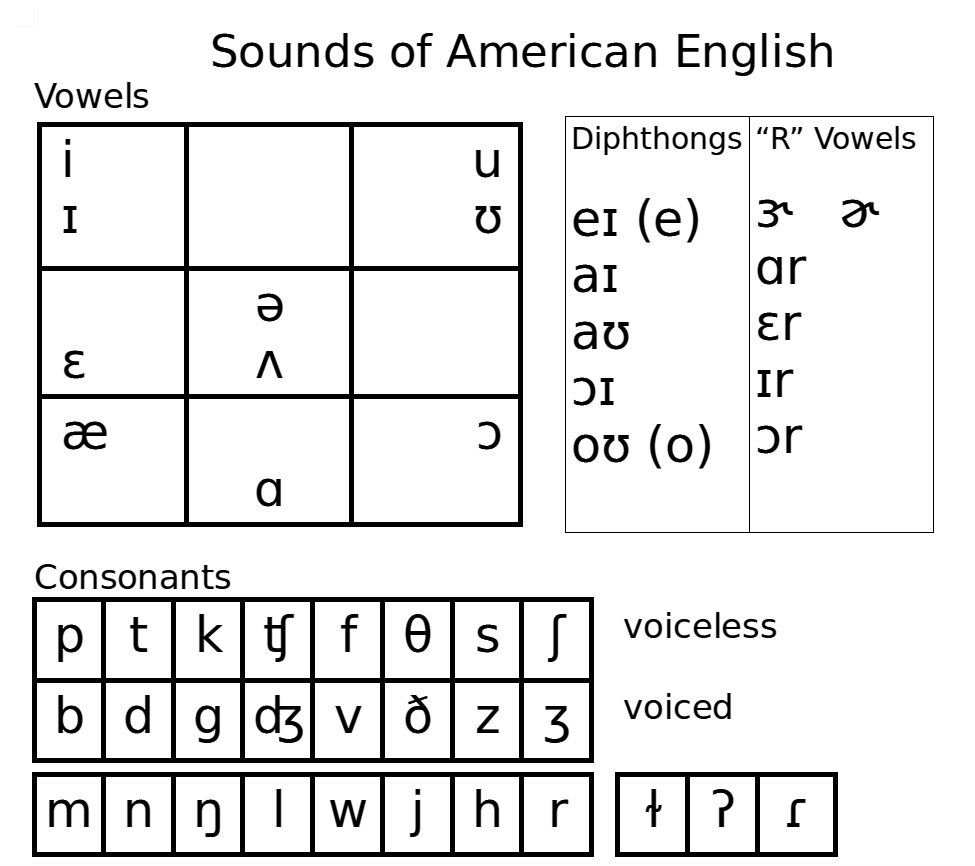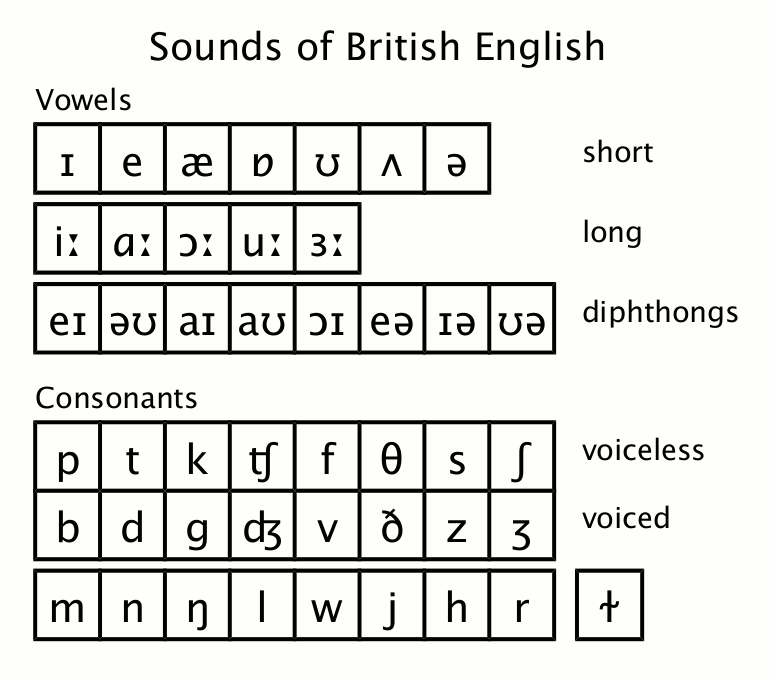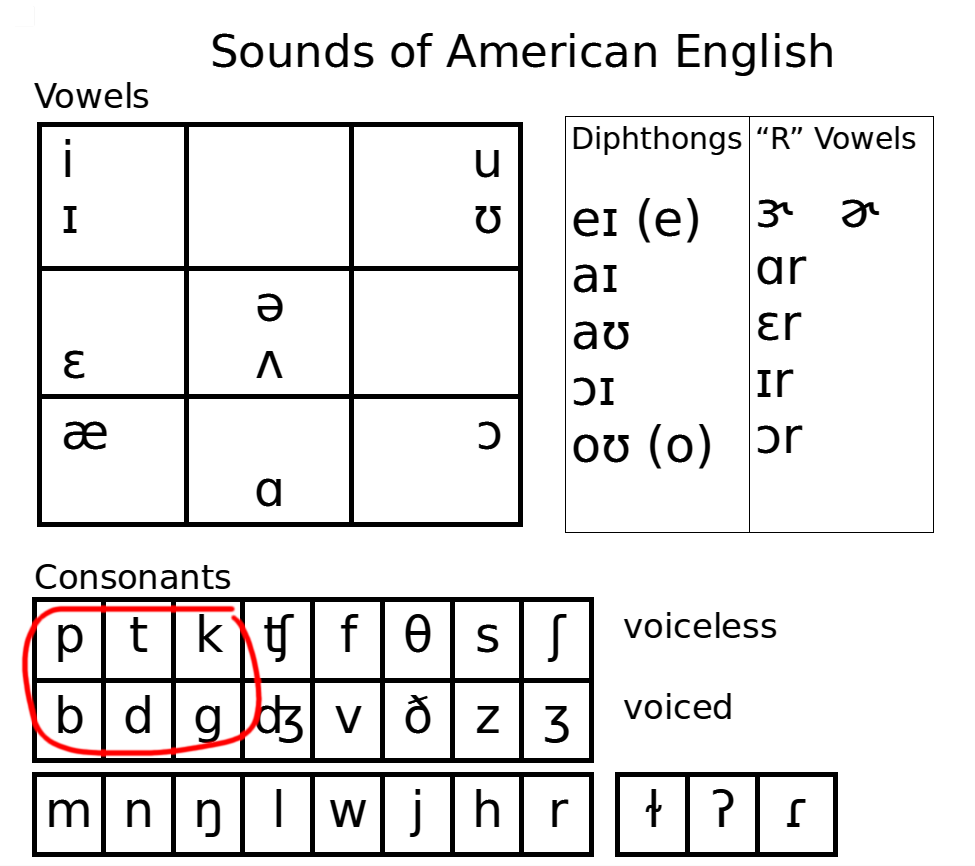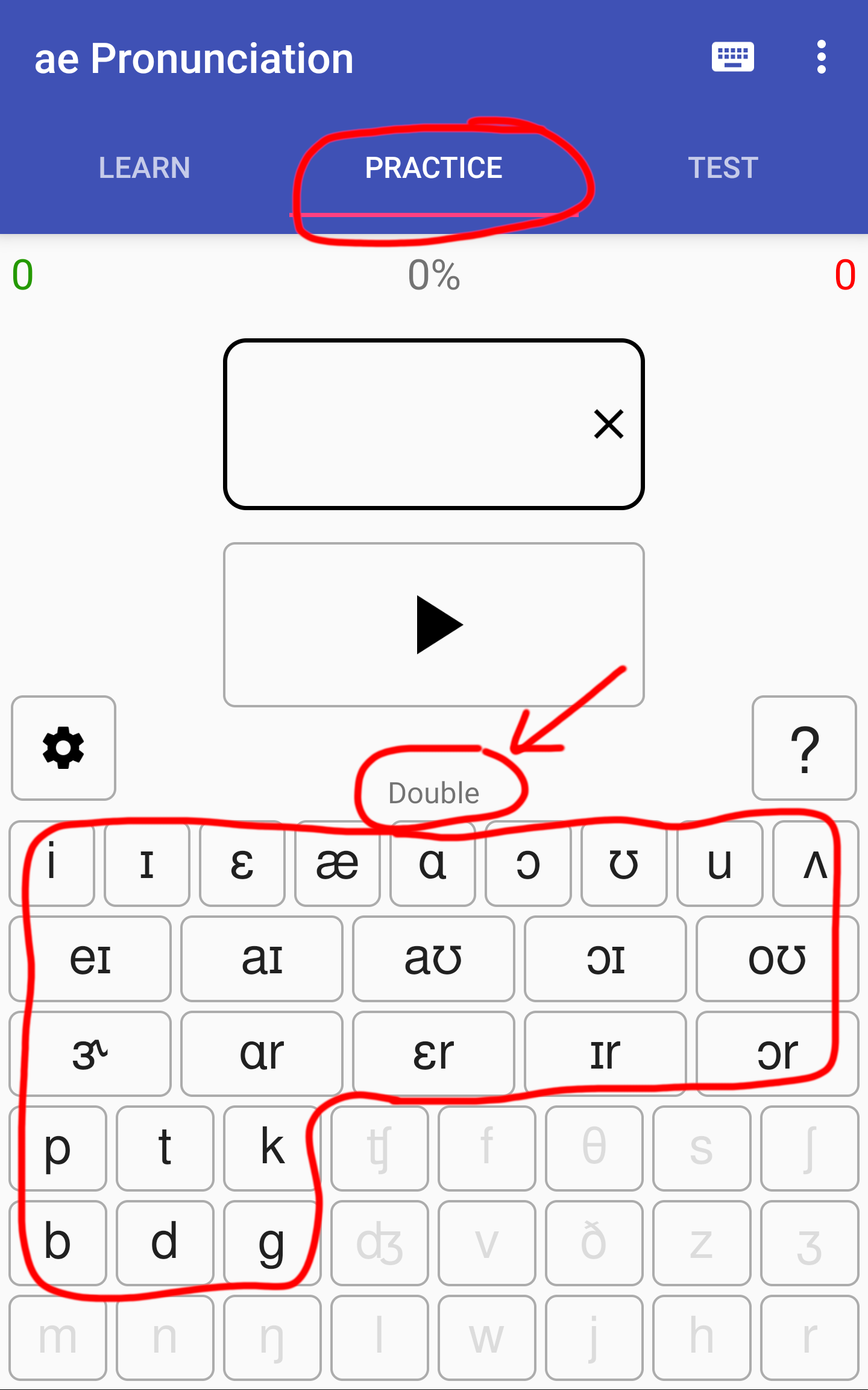We’ve finished the vowels. Today we’re going to move on to the consonants.
Review
Review the American English phonetic chart:

And review the British English vowels:

IPA Reading
An except from Beauty and the Beast:
ə’nʌðɚ mæn sɛd tə ðə ɛldəst dɑdɚ, aɪ ʧeɪnʤd maɪ maɪnd bi’kʌz ju doʊnt hæv ‘ɛni ‘mʌni. bʌt wʌn mæn ræn tə ‘bjudi ɛn sɛd, pliz ‘mɛri mi. wi kʊd lɪv ‘hæpɪli tə’gɛðɚ. bʌt ʃi ‘kʊdənt liv hɝ ‘fɑðɚ. maɪ ‘fɑðɚ ɪz oʊld. aɪ hæf tə steɪ wɪθ hɪm.
Plosive Consonants
Have you ever blown up a balloon until it pops?
That’s a little like what plosive consonants are like. You can even see the explosion in the word plosive.
The plosive consonants are /p/, /b/, /t/, /d/, /k/, /g/.

The /p/ and /b/ sounds
Words
- pen, Ben
- pat, bat
- pot, bot
- path, bath
- rope, robe
- rip, rib
- gap, gab
- cup, cub
Phrases
- a pot of barley
- a big pig
- hobnob and hip hop
- play a piano
Tongue twisters
Peter Piper picked a peck of pickled peppers.
If Peter Piper picked a peck of pickled peppers,
how many pecks of pickled peppers did Peter Piper pick?
A big black bug bit the back of a big black bear.
The big black bear bit back the big black bug.
Following /s/
sports, spark, spend, spill, speak
The /t/ and /d/ sounds
Words
- tad, dad
- ten, den
- top, dop
- teen, dean
- tool, duel
- oat, ode
- wrote, rode
- right, ride
- sight, sighed
- light, lied
Phrases
- riding light
- Tick tock, time’s a wastin’.
- dig it deeper
Following /s/
stove, step, stop, store, still, steam
The /k/ and /g/ sounds
Words
- kill, gill
- cob, gob
- cool, ghoul
- Kate, gate
- pick, pig
- dock, dog
- duck, dug
- back, bag
- trick ‘er, trigger
Phrases
- kill the carier
- pick good ones
- Can he come?
- Let’s get going.
Following /s/
sky, skip, skin, skate, scream, scatter
Song
Before we finish this lesson I want to teach you a few more pronunciation rules.
The pronunciation of /p/, /t/, /k/ at the end of words
Aspiration means that you use the air from your lungs to make a sound. If a consonant is unaspirated then you just use the air in your mouth to make the sound.
/p/, /t/, /k/ are aspirated at the beginning of words
| pen | ten | Ken |
| pill | till | kill |
| pea | tea | key |
You should be able to feel the breath come out in a little burst when making these consonant sounds.
/p/, /t/, /k/ are unaspirated at the ends of words
| cap | feet | pick |
| rope | hot | back |
| cup | let | lock |
You shouldn’t feel a puff of air or hear a hiss at the ends of these words.
When are vowels short and when are they long?
You should have noticed that sometimes a vowel is long in American English and sometimes that same vowel is short. The difference is related to whether the consonant that comes after it is voiced or voiceless.
Vowels are long before a voiced consonant (b, d, g, ʤ, v, ð, z, ʒ, m, n, ŋ, l)
- cob
- odd
- pig
- judge
- save
- bathe
- has
- beige
- mom
- ton
- sang
- fill
Vowels are short before a voiceless consonant (p, t, k, ʧ, f, θ, s, ʃ)
- heap
- hot
- back
- latch
- laugh
- bath
- base
- fish
Comparison
- lab – lap
- feed – feet
- dog – dock
- age – “H”
- prove – proof
- clothe – cloth
- close – close
- massage, Josh
The many sounds of “t”
The letter “t” seems like such a simple letter. It just says /t/, right? Wrong. The letter “t” has at least five sounds in American English.
1. Aspirated t
The letter “t” is aspirated at the beginning of words and stressed syllables.
- two
- tie
- toe
- telephone
- attend
- attack
- Italian
- photography
2. Unaspirated t
The letter t is not aspirated at the end of words:
- it
- bite
- note
- hot
- what
It’s also unaspirated after the letter “s”:
- stop
- store
- stand
- astounding
3. Flap t
This is the phoneme /ɾ/. It sounds almost like a very fast /d/ sound.
It happens in American English when the letter “t” comes between vowels (and some consonants) in an unstressed syllable.
- water
- little
- matter
- daughter
- put on
- writer
- bottom
- a lot of
- thirty
- forty
- about her
4. Glottal stop
This is the phoneme /ʔ/. You hear this sound in the middle of the the word uh-oh.
You often get a glottal stop when the letter “t” is after a vowel (or “r”) and before the /n/ sound.
- button
- fountain
- partner
- written
- kitten
- forgotten
You also get it when “t” is after a vowel (or “r”) and before a consonant.
- apartment
- might be
- white goose
- it walks
Many times (but not always) speakers will use it before a pause.
- Stop it!
- I might be late.
- Look at that.
5. Silent t
The letter “t” is often omitted when it comes after “n” and before a vowel (or “r” or “l”).
- center
- advantage
- winter
It’s also omitted when it occurs between consonants:
- acts
- accepts
- fast pig
- walked slowly
- correctly
Homework
Practice at least 50 Double sounds (vowels and consonants). You can select those in the settings.

